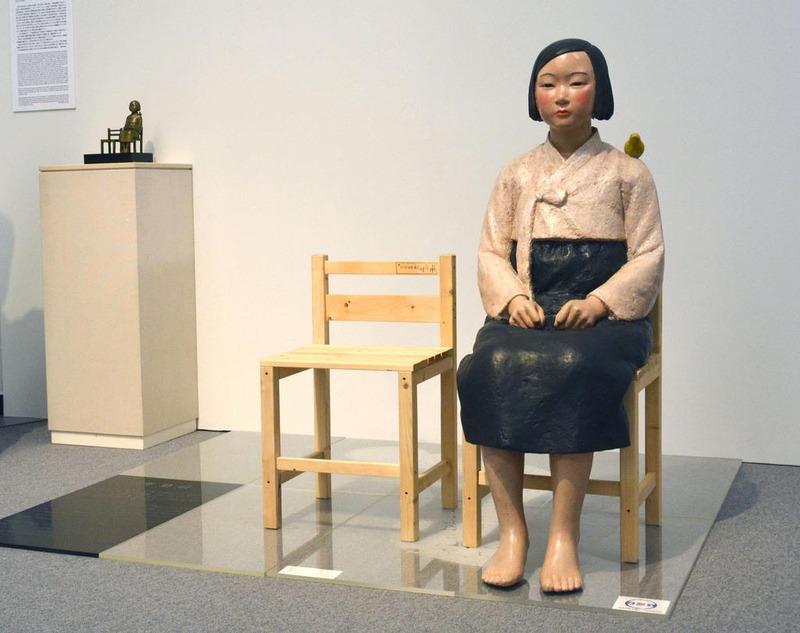We, the undersigned artists and cultural workers, feel compelled to speak out against the closure of “After ‘Freedom of Expression?’” at Aichi Triennale 2019 from the perspective of gender equality—one of the stated principles of the Triennale’s organization.
One of the primary targets of the harassment and threats of violence received by the Triennale was the sculpture Statue of Peace by Korean artists Kim Seo-kyung and Kim Eun-sung, a work inspired by the voices and experiences of the women who suffered under the “comfort woman” system of forced prostitution, sexual slavery, and human trafficking exploited by the Imperial Japanese Army and Navy in military campaigns in the Asia-Pacific from the 1930s onwards. This is a work of art that fundamentally addresses the human rights of women. Contrary to contentions that it espouses anti-Japanese propaganda, Statue of Peace was made by the artists to commemorate the courage of the survivors of the “comfort woman” system, to acknowledge their trauma, and to encourage the public to reflect on the history of conflict-related sexual violence. The opposition and hate speech that have been directed against the work in recent weeks, as well as the pressure that politicians have applied on the Triennale in their calls for the work’s removal, are rooted in misperception and far exceed fair critique of the work. Such responses to the work unfortunately reflect the pervasive entrenchment of discrimination against women in Japanese society today, and stand in direct contradiction to the Triennale’s commitment to gender equality.
Despite the many decades that have passed since the era of the “comfort woman” system, gender-based discrimination remains pervasive at all levels of Japanese society today. Such discrimination of course affects diverse genders. To accept it is to perpetuate the violation of the human rights of all genders and others in socially vulnerable or marginalized positions.
With acute consciousness of the history of sexual violence and discrimination to which the survivors of the “comfort woman” system were subjected, we voice our strong objection to all forms of gender discrimination, as well as to discrimination in general.
Statue of Peace could have provided an opportunity for much-needed discussion in the context of the Triennale. This opportunity has sadly been lost due to verbal attacks and threats of violence. We harbor grave misgivings that the same kind of violent suppression of human rights–related discourse will be used again in the future to silence those who wish to address Japan’s history of aggression. Yet after all that has happened, we still believe in our capacity to empathize with and love others, and in the creativity of art past, present, and future as means for resisting such forces of oppression. As such, we call for the complete restoration of the autonomy of the Triennale and its participating artists, starting with the necessary reopening of “After ‘Freedom of Expression?’”
September 4, 2019
Signed by 155 artists and cultural workers (as of September 4, 2019)
Petition form: https://forms.gle/a4GL61xnxXByhBJW9
An updated list of signatories can be found here.
Adachi Yusuke
Ai Ohashi (“After ‘Freedom of Expression?’”)
AIKYO Koji
Akemi Sakamoto
Akiyama Kanako
Amano Chieko
Amano Chika
Ahn Sehong (“After ‘Freedom of Expression?’”)
Andrew Maerkle
Anna Hulacova
Aota Yumi
Arai Hiroyuki (“After ‘Freedom of Expression?’”)
Asano Moe
Azumi Kajiwara
Candice Breitz
Chan Cho Kiu
Chim↑Pom (“After ‘Freedom of Expression?’”)
Dora Garcia
Endo Kaori
Endo Mizuki
Fujii Hikaru
Fujiki Naomi
Fujiki Rika
Fujishima Yutaka
Furukawa Mika
Furukawa Yumiko
Ge Yulu
Hamasaki Fumina
Hara Makiko
Hashimoto Satoshi
Hibi Yoshitaka
Hirai Yu
Hirano Fumie
Homma Mei
Honjyo Chikae
Horisaki Takashi
Hozumi Toshiaki
Hukushima Natsuko
Ichijo Miyuki
Ichimura Misako
Ide Kenji
Idetsu Kyoko
Igeta Hiroko
IIYAMA Yuki
Ikezaki Takuya
Ikuyo Yamamoto
Inoue Akihiko
Inoue Fumio
Irie Maki
Ishida Yoshiyuki
Ishikawa Takuma
Isihara Nen
Ito Ruri
Ito Tari
Iwaki Kyoko
Jason Waite
Jinushi Maiko
Kamimura Megumi
Kanai Shoko
Kaneta Tsutomu
Kaneta Tsutomu
Kano Ai
Katarina Zdjelar
Kira Tomoko
Kitahara Megumi
Kim-Eun-sung (“After ‘Freedom of Expression?’”)
Kim-Seo-kyung (“After ‘Freedom of Expression?’”)
Koizumi Meiro (“After ‘Freedom of Expression?’”)
Kokatsu Reiko
KUNIMATSU Rika
Kushi Kaoru
Kyun-Chome
Leung Chi Wo + Sara Wong
Ma Ran
Machimura Haruka
Matake Makiko
Matsushita Seiko
Matsuzaki Yuko
Mika Eglinton
Minkyung Choi
Miriam Cahn
Miyakawa Tomohiro
Miyakoshi Satoko
MIZUNO Ryoko
MIZUNO Ryoko
MOMOSE Aya
Monica Mayer
Mori Yoshitaka
Moto Hidenori
Motoyama Hisako
Murai Noriko
Nagakura Yukiko
Nagata Kouzou (“After ‘Freedom of Expression?’”)
Nakamura Hiroko
Nakamura Kyoko
Nakao Hanae
Nihonbijyutukai
Nina Horisaki-Christens
Womens Action Network
Nito Kento
Ogawa Nozomu
Ogawa Tomoko
Ogura Toshimaru
Okamoto Yuka (“After ‘Freedom of Expression?’”)
Oku Masayuki
Ookubo Ari
Osaka Koichiro
Otake Keiko
Ozaki Midori
pangrok sulap
Park Chan-kyong
Rachi Akira
Ray Thoma
Regina José Galindo
Sadaaki Iwasaki
Sakamoto Natsumi
sakurai keisuke
Sato Maiko
Sayaki Oguri
Shimada Yoshiko (“After ‘Freedom of Expression?’”)
Shimbo Kiyono
Shinichi Takashima
Shinohara Kumiko
Shirai Mio
Shirakawa Yoshio (“After ‘Freedom of Expression?’”)
Shu Taguchi
Stuart Ringholt
Sumitomo Fumihiko
Tachibana Hiroshi
Takeya Daisuke
Taki Asako
Tan Ru Yi
Tanaka Koki
Tanaka Natsuko
Tania Pérez Córdova
TANIZAWA Sawako
Tanokura Kouichi
Teppei Higuchi
Toda Teiichi
Tsuchiya Seiichi
Tsuda Michiko
TSUGA MEGUMI
URA Ayaka
Utamura Hanae
Watabuki Nobuko
Watanabe Eri
Yabumae Tomoko
Yamamoto Seiko
Yokochi Sawako
Yoshigai Nao
Yoshiki Marie
Yoshimoto Midori
Yumi Song
Yui Usui
Image: Statue of Peace by Kim Seo-kyung and Kim Eun-sung. Via agora-web.jp.
